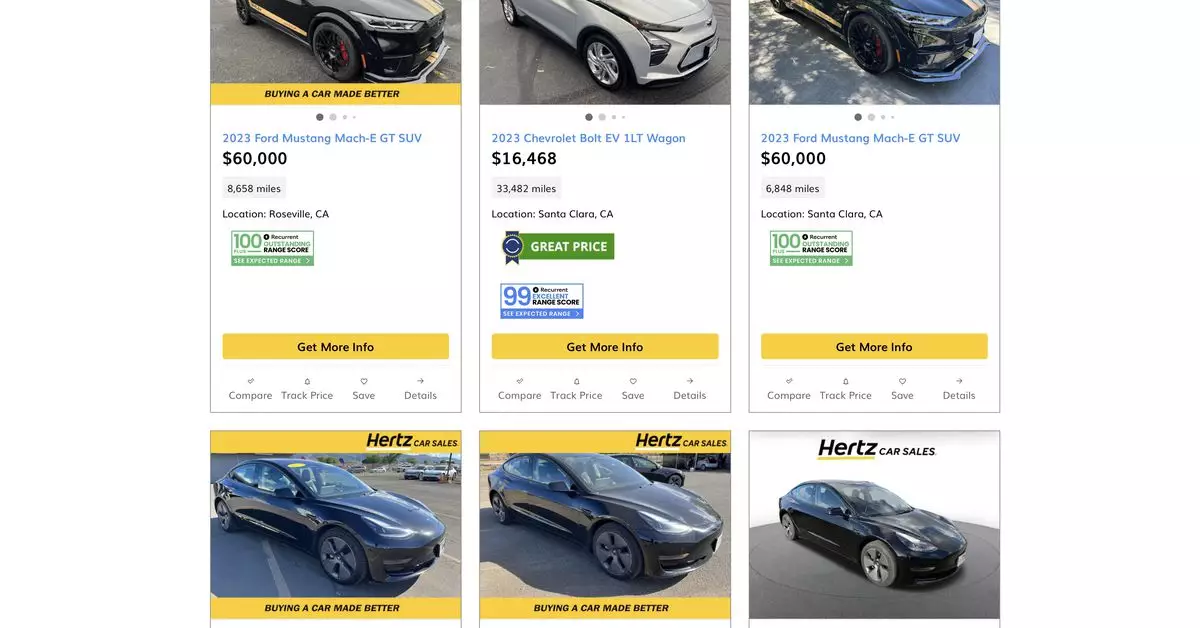As the automotive industry continues to shift towards electrification, rental companies are exploring new opportunities that cater to the distinct demands of electric vehicle (EV) enthusiasts. Recently, Hertz has taken a notable step by reaching out to customers who have rented electric vehicles, presenting them with an option to purchase the very vehicles they have been using. This approach could reshape the rental experience, transforming it into a potential pathway to vehicle ownership for consumers.
The Offers: Pricing Insights
In a surprising turn of events, several renters have reported receiving compelling purchase offers for their rental vehicles. For instance, a Reddit user mentioned that they were quoted $17,913 for a 2023 Tesla Model 3 with approximately 30,000 miles on the clock, which aligns well with current offerings on the Hertz Car Sales website. This price point is competitive, especially given the vehicle’s mileage relative to other listings. Furthermore, the offers extend beyond Tesla, with a 2023 Chevy Bolt available for $18,442, and a Polestar 2 presented at $28,500. The price differentials suggest that Hertz is keenly aware of market trends and is attempting to position itself favorably against other used car sales outlets.
One of the notable features of these offers is the limited warranty that accompanies the used vehicles. Potential buyers are assured of a 12-month, 12,000-mile powertrain warranty, which adds a layer of security for uncertain consumers. Moreover, the provision for a buy-back offer within seven days stands out as a significant risk mitigator. This strategy not only enhances consumer confidence but also encourages potential buyers to explore the possibility of owning an EV without the immediate pressure of commitment.
When posed with questions about whether these offers are part of a special campaign for EVs or a routine strategy, Hertz’s Communications Director, Jamie Line, clarified that the initiative serves multiple purposes. It facilitates a direct connection between renters and Hertz’s sales channels, effectively raising awareness about their vehicle sales while providing an exclusive opportunity to those who have experienced the vehicle firsthand. This approach demonstrates a savvy marketing strategy focused on building lasting relationships with customers, transforming them from renters to potential buyers.
Despite Hertz’s innovative offerings, the company has previously acknowledged certain challenges in scaling its electrified rental fleet. Factors such as low customer demand and repair issues associated with some electric models, including the Tesla Model 3, prompted Hertz to reevaluate its ambitions. In a noteworthy twist, the company decided in February to cease purchases of Polestar 2 vehicles, even as they plan to offload approximately 30,000 Teslas from their rental inventory. This signifies a strategic shift, reflecting the complexities and unpredictability of the EV market as consumer preferences continue to evolve.
Hertz’s initiative to connect renters with purchase opportunities represents a pivotal moment in the rental industry, particularly regarding electric vehicles. By providing competitive purchasing options paired with warranties and flexible buy-back offers, Hertz is not just promoting vehicle ownership; it is redefining the rental experience itself. As the demand for electric vehicles continues to grow, such innovative strategies may pave the way for a more engaged and loyal customer base. Ultimately, the transformative power of this model could mark a significant shift in how consumers perceive the rental and sales landscape in the automotive sector.


Leave a Reply